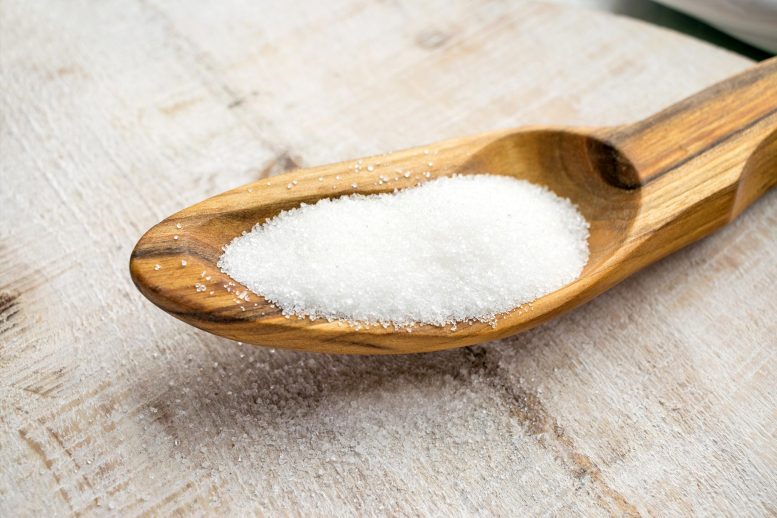
Posted on 07/10/2024 5:46:39 AM PDT by Red Badger

Sucralose, an artificial sweetener, cannot be broken down by humans or many microorganisms, leading to its presence in water systems. A study found that sucralose alters the behavior of cyanobacteria and diatoms, potentially disrupting ecosystems. More research is needed to understand its full environmental impact.
New research explores the environmental implications of sucralose, showing its potential to disrupt aquatic microbial populations and stressing the need for further research to assess its full impact. Scientific research has well established that the human body cannot break down sucralose, an artificial sweetener present in numerous zero-calorie foods and beverages. Due to its stability, sucralose can pass through wastewater treatment processes and consequently, it is found in drinking water and aquatic ecosystems.
“We can’t break down sucralose, and a lot of microorganisms can’t break it down, either, because it’s a really tough molecule that doesn’t degrade easily. So there are a lot of questions about how it is affecting the environment and whether it’s something that could impact our microbial communities,” said Tracey Schafer, an assistant research scientist for the University of Florida’s Whitney Laboratory for Marine Bioscience and the soil, water and ecosystem sciences department, part of UF’s Institute of Food and Agricultural Sciences.
Study on Cyanobacteria and Diatoms
Schafer is a co-author of a recently published study demonstrating how sucralose affects the behavior of cyanobacteria — an aquatic photosynthetic bacteria — and diatoms, microscopic algae that account for more than 30% of the primary food production in the marine food chain.
Researchers collected soil and water from a freshwater site and a brackish water site in Marineland, Florida. Back at their St. Augustine lab, they exposed samples to different sucralose concentrations and measured photosynthesis and microbial respiration in two separate time studies: every four to six hours during a single day and every 24 hours over the course of five days.
Compared to a control group, the concentration of freshwater cyanobacteria increased when samples were exposed to sucralose, but the concentration of brackish cyanobacteria spiked and then crashed when dosed.
“There is the potential that the freshwater communities might be mistaking sucralose for a nutrient, for a sugar that they can use as food,” said Amelia Westmoreland, the study’s lead author and a scientific researcher who worked on the project while completing her undergraduate degree in chemistry.
Potential Risks and Further Research Needed
Both freshwater and brackish diatoms exposed to sucralose displayed an overall decreasing trend in population compared to a control group. The difference between dosed samples and the control group was most profound, however, in the freshwater experiments.
Sucralose’s ability to both increase and decrease microbial community populations could potentially threaten a naturally balanced ecosystem, Westmoreland said.
“Extreme examples of how this could play out are the diatom community could disappear, and the other extreme is this community could completely overtake everything else,” she said.
Both Schafer and Westmoreland said more research is needed to fully understand sucralose and its impact on aquatic environments.
“I think this study was a good first step in starting to look at how sucralose could impact our aquatic communities, and hopefully it will drive more research forward,” Schafer said.
Reference:
“Sucralose (C12H19Cl3O8) impact on microbial activity in estuarine and freshwater marsh soils” by Amelia G. Westmoreland, Tracey B. Schafer, Kendall E. Breland, Anna R. Beard and Todd Z. Osborne, 13 April 2024, Environmental Monitoring and Assessment.
DOI: 10.1007/s10661-024-12610-5
Just stop eating wheat and you’ll stop craving sugar.
Wheat clogs up your systems so you aren’t absorbing nutrients. So the more you eat, the hungrier you get.
Stop (RELIGIOUSLY!!!) for one month and see it it helps you. It changed my entire life.
(but caution! you have to be absolutely committed to no-wheat. If you eat any bread or noodles you have to start all over.)
Just eat fresh meat and veggies. That makes it easy. It sounds like it would expensive- but its not. The first thing you will notice is that you are no longer hungry all the time. I sometimes forget if I’ve eaten some days. I used to eat an entire steak for dinner, but now I can easily be satisfied if I cut it into 4 pieces.
The 2nd thing is that your stomach will deflate like a balloon. (actually that might be the first thing)
You must have read “UN-Doctored” and “Wheat Belly”............
I had that in Canada, and it tastes really good.
Fake Scientists at it again ,LOL
I can think of a few thousand pit bulls I’d like to feed Xylitol to.
This stuff can be broken down, but it takes a breeder fission reactor.
Interesting.
There was a story a couple of weeks ago that a dog died after eating a piece of chewing gum a little boy next door had thrown at him. It don’t take much............
UNIVERSITY OF FLORIDA - inventors of Gatorade!................
Florida State tried to come up with their own version, but Seminade, only sold well in San Francisco.

Why don’t these clowns “discover” what illegal alien humnan waste is doing to disrupt our “ecosystem” down along the border. Endangered species don’t even attempt to cross back and forth across the border because of the sanitation catastrophe going on in the ecosystem down there.
Sucralose was discovered in 1976 by scientists from Tate & Lyle, working with researchers Leslie Hough and Shashikant Phadnis at Queen Elizabeth College (now part of King’s College London). While researching novel uses of sucrose and its synthetic derivatives, Phadnis was told to “test” a chlorinated sugar compound. According to an anecdotal account, Phadnis thought Hough asked him to “taste” it, so he did and found the compound to be exceptionally sweet.
https://en.wikipedia.org/wiki/Sucralose
Sugar has only 16 calories per teaspoon, and an adult shouldn’t have more than 7 - 8, per day, maybe a little more depending on size. I’ve only had artificial sweeteners a few times, and that was by mistake. Couldn’t stand the stuff. Sugar or honey for me.
No, I haven’t read those, I am speaking purely from experience.
I don’t remember where I heard about skipping wheat, but I gave it a try after I experienced allergic reaction (severe itching) that was ‘fixed’ by Benadryl- indicating an allergy
So by process of elimination (i am an actual scientist) I determined it to be from wheat (or possibly the chemicals they allow to be put on wheat)
When I stopped eating wheat 2 things happened immediately- 1) my stomach deflated like a balloon
2) I was no longer hungry all the time, and snacking al day long.
My general health improved over time too- after I added vitamins and minerals too. (especially vitamin D and magnesium)
Ok gator that was good . What is found on milk cartons in San Francisco? The backs of heads of missing homos
hee hee
HIGHLY RECOMMENDED!..........
Everything you describe is in those two books..............and more!...........
Avoid all grains, wheat, barley, rye, rice, corn. We are not cows...............
Disclaimer: Opinions posted on Free Republic are those of the individual posters and do not necessarily represent the opinion of Free Republic or its management. All materials posted herein are protected by copyright law and the exemption for fair use of copyrighted works.